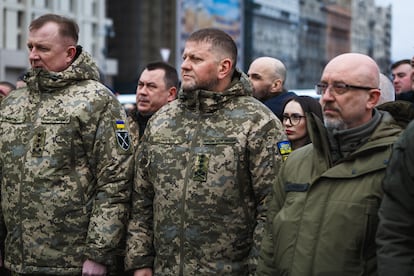Valerii Zaluzhnyi, the man with Ukraine’s future in his hands
Ukraine’s counteroffensive against Russian troops will be the ultimate test of leadership for the army’s commander-in-chief, a hero in his country and the only person whose popularity compares to Volodymyr Zelenskiy’s


Russia’s number-one enemy isn’t Volodymyr Zelenskiy. If there’s one Ukrainian that Moscow would like to eliminate, it’s Valerii Zaluzhnyi. Last week, the Russian news agency Tass reported that Zaluzhnyi, the commander-in-chief of the Ukrainian armed forces, had suffered a serious head injury during a missile attack on a command post on the frontline in Kherson. The claim was greeted by jubilation on Russian social media. Zaluzhnyi is seen publicly only intermittently, and Russian propaganda sought to portray his absence from view as a sign that Ukraine’s chief military hero was now out of action. However, Zaluzhnyi reappeared a few days later, taking to social media to stress that he remained in one piece and was ready to lead the imminent Ukrainian counteroffensive that is expected to define the outcome of the war.
In Ukraine, Zaluzhnyi is the only person whose popularity compares to that of the president. Zelenskiy is the first politician to have earned widespread respect among a population used to political quarrel after political quarrel. Ukrainians have tended to write their leaders off as corrupt, as puppets controlled by the economic power of the oligarchs — and of Russia. Zelenskiy comfortably won Ukraine’s presidential elections in 2019, before his party secured an absolute majority in the parliamentary elections that followed soon after. Polls show that the president would win even more comprehensively now. Firstly, because he didn’t flee when it seemed Kyiv could fall into Russian hands; secondly, because he is a leader who has fostered a Ukrainian society which, for the first time, is united by a clear national sentiment.
However, being respected is one thing; being admired is quite another. And Zaluzhnyi is admired. “He’s my idol,” says Vladislav Fadeev, the mayor of Vatutine, a town of some 1,200 inhabitants in Ukraine’s eastern Kharkiv province. “We thank God for giving us this man. We trust him to lead us to victory.” In February, Vatutine’s municipal parliament voted to change the town’s name to Zaluzhne, in the commander-in-chief’s honor. A town founded in 1948, Vatutine’s current name commemorates the Soviet general Nikolai Vatutin, a Second World War hero. News of the planned change spread like wildfire across Ukraine.
“Every era has its heroes,” Fadeev says, “and we have to move with the times.” Not everyone is so sure about the change. “It should have been put to a vote among residents,” says Alexandra Tridub, 36, as she walks through the countryside town with her baby. “It’s going to cause a right old mess, because there are already two Vatutines in Ukraine and the postal service is always getting them mixed up. Now, every region across the country will have a town named after Zaluzhnyi.”
Vatutine’s new name must be approved first by the Ukrainian Institute of National Memory, then by the country’s parliament, Fadeev explains. The loophole that the town hall has found to ward off a potential veto — which would seek to avoid too many Zaluzhnyis appearing on the Ukrainian map — is the choice of the name Zaluzhne, which can mean “beyond the fields” in Ukrainian. And why not rechristen the town after Zelenskiy? Fadeev replies that there will certainly be many places that will take the president’s name in future, but Vatutine won’t be one of them.
Generals and politics
What other Ukrainian general could Vatutine be named after? As she buys seeds for her vegetable garden at the only grocery store open in the town, Natalia Hakonenko admits that she can’t answer that question. “I don’t know any other generals, because I prefer not to comment on politics,” Hakonenko says. Her words bring to mind a remark made to this newspaper by a chief of staff for one of the members of Ukraine’s general staff in May: “In Ukraine, generals don’t only have military influence, but also political influence. And they don’t only have military enemies, but also political enemies.” In a country as highly militarized as Ukraine, it’s common to see major military officials move into politics.
Zelenskiy appointed Zaluzhnyi as commander-in-chief in 2021, tasking him with modernizing the country’s armed forces, moving them away from the rigid, hierarchical Soviet model. EL PAÍS has spoken to a high-ranking military official who is close to Zaluzhnyi, and a member of the Rada — the country’s parliament — who is in regular contact with Ukraine’s military leaders. Both individuals, who have asked to remain anonymous, agree that the president and the commander-in-chief are pulling in the same direction — but have their differences, too. Those differences, they say, aren’t so much caused by Zelenskiy himself as the team surrounding the president, particularly his right-hand man, Andriy Yermak. For example, EL PAÍS’ sources reveal, heads of state and government have sought meetings with Zaluzhnyi, but the president’s office has been quick to scotch such proposals.
Zaluzhnyi has only given three interviews in the 15 months since the Russian invasion began. Two were to overseas magazines — Time and The Economist — and the other was a video interview with the Ukrainian journalist Dmytro Komarov. In his sit-down with Komarov in May, Zaluzhnyi came across as comfortable in front of the camera, a good speaker with an ability to get through to the ordinary citizen with phrases that combine humility and heft. If there’s anyone who can compete with Zelenskiy politically, it is Zaluzhnyi. There are no indications that the general is planning to, but it is by no means an outlandish idea. When this newspaper visited a military post that keeps watch over the border between Kharkhiv province and Russia on Saturday, the soldiers stationed there discussed the possibility of their commander-in-chief running in future presidential elections. “When I watched his interview with Komarov, what I saw was an exceptional person on a human level, above and beyond his role as a military leader,” says Ruslan, a border-patrol soldier. “I don’t know whether or not he’d be a good politician, but he certainly has the potential to connect with people.”
Zaluzhnyi has given his opinion on political decisions on only a handful of occasions — but when he has, he has had an effect. In December, he spoke out in support of proposed legislation aimed at toughening the penalties handed down to deserters. Zelenskiy was left with no option but to sign the bill into law. The commander-in-chief has only once been at the center of political controversy. In January, the Rada posted a photo online of Zaluzhnyi next to a painting of Stepan Bandera, who led the Ukrainian far-right during the 1930s and 40s, and is a figure with legendary status among the country’s most radical nationalists. Complaints by the Polish government, a major ally of Ukraine, forced the parliament to remove the image.
In the lead-up to the Russian invasion, Zelenskiy and Zaluzhnyi had adopted different stances. While the president ruled out a Russian attack right up until the last moment, the commander-in-chief deemed it an inevitability. “We had been at war for eight years, we knew this would happen,” Zaluzhnyi told his interview with Komarov, referring to the Donbas war and Russia’s annexation of Crimea. “We had been preparing for this for eight years.” In the first interview he gave after the invasion, to Time, Zaluzhnyi outlined how in the weeks before it began he had set about preparing the defense of Kyiv in total secret.
When Zelenskiy came to power, he promised dialogue with Russia in a bid to end the war in Donbas. In March 2022, when Russia’s invasion was just a few weeks old and Kyiv was under siege, he continued to offer dialogue to Russian President Vladimir Putin. According to sources consulted by EL PAÍS, Zaluzhnyi was at pains during the early stages of the war to persuade the president’s office that Ukraine could defend itself and turn the situation around.
Speaking to soldiers on the frontline, it’s common to hear declarations of absolute faith in Zaluzhnyi; when it comes to Zelenskiy, less so. In Bakhmut, where a brave defense of the eastern city has now lasted for eight months, there is regular criticism of Zelenskiy among soldiers, who hold him chiefly responsible for a battle that has led to thousands of deaths with no apparent breakthrough. In reality, however, Zaluzhnyi has made it clear that the Bakhmut resistance is his decision.
“I’d like Zelenskiy to keep Zaluzhnyi in his post,” EL PAÍS was told in May by Olga Muja, a resident of Ostriv, a village in Zaporizhzhia province. This newspaper spoke to Muja as part of a journey across the war’s frontline. Ostriv sits on the western banks of the Dnipro river, opposite the Russian-occupied nuclear power plant in Enerhodar. Muja is 66 and is retired. She says she doesn’t know anything about military matters, but has blind faith in the commander-in chief. When asked about Zelenskiy, her immediate reaction is silence, her head tilted to one side. Finally, she says that, unlike others, he didn’t flee when the war began and has remained the country’s spearhead, proving particularly effective at earning international support. “I think we’re lucky to have both of them leading the country,” says Hakonenko in Vatutine, the future Zaluzhne. “One governs the people and the other defends the country, and the results show that they’re a good team,” Fadeev adds.
Every day, Zelenskiy addresses the nation. Zaluzhnyi speaks publicly only now and again, but when he does, he has an extraordinary effect on public morale. That was clear to see when, at the end of May, he posted a patriotic video on social media, announcing that everything was set for Ukraine’s much-anticipated counteroffensive. His morale-boosting abilities were also in evidence when he was interviewed by Komarov. “It’ll take time, but we’ll free the Crimean peninsula, Donetsk and Luhansk,” Zaluzhnyi said. “I have no doubts about that. I know what we need to do.” The commander-in-chief’s words, Komarov responded, were exactly the message of hope that millions of Ukrainians were looking for.
Sign up for our weekly newsletter to get more English-language news coverage from EL PAÍS USA Edition
Tu suscripción se está usando en otro dispositivo
¿Quieres añadir otro usuario a tu suscripción?
Si continúas leyendo en este dispositivo, no se podrá leer en el otro.
FlechaTu suscripción se está usando en otro dispositivo y solo puedes acceder a EL PAÍS desde un dispositivo a la vez.
Si quieres compartir tu cuenta, cambia tu suscripción a la modalidad Premium, así podrás añadir otro usuario. Cada uno accederá con su propia cuenta de email, lo que os permitirá personalizar vuestra experiencia en EL PAÍS.
¿Tienes una suscripción de empresa? Accede aquí para contratar más cuentas.
En el caso de no saber quién está usando tu cuenta, te recomendamos cambiar tu contraseña aquí.
Si decides continuar compartiendo tu cuenta, este mensaje se mostrará en tu dispositivo y en el de la otra persona que está usando tu cuenta de forma indefinida, afectando a tu experiencia de lectura. Puedes consultar aquí los términos y condiciones de la suscripción digital.








































